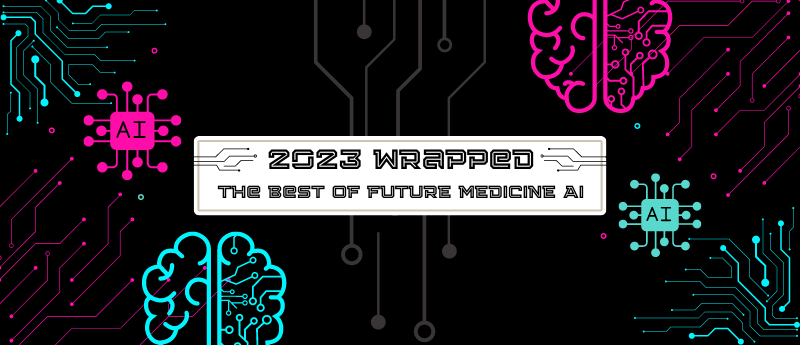2023 wrapped: the best of Future Medicine AI

As 2023 draws to a close, we are reflecting back on some of the highlights for the journal Future Medicine AI and our digital site Future Medicine AI Hub (FMAI Hub).
Before we dig in, we’d like to take a moment to thank you as our dedicated and valued members and readers, for your support and hand in contributing to FMAI. This year has seen the launch of both our digital content hub and first two journal issues, and we are excited to continue advancing the application of AI in medicine, through offering access to trusted and engaging resources in this exciting and innovative field.
So, without further ado, here is a curation of some of the most popular features from FMAI Hub and the top read articles for Future Medicine AI.
We hope you enjoy these features and wish you a wonderful new year!
Best wishes,
The FMAI team

Ask the Experts: The medical potential of ChatGPT
This ‘Ask the Experts’ feature offers an insight into the main barriers that prevent the widespread adoption of ChatGPT in healthcare, ethical concerns of this adoption, and if our experts think that any areas in medicine will come to routinely use ChatGPT in the future.
Podcast: Brain-computer interfaces and neuroethics: an interview with Uthman Ali
Let’s talk thought-reading technology. What kind of ethical issues do brain-computer interfaces pose to society? In this podcast, we delve into the world of neuroethics with Uthman Ali from the World Economic Forum AI Alliance (Geneva, Switzerland).
Video: AI ethics in medical research projects: an interview with Ismael Kherroubi García
In this video interview, we speak with Ismael Kherroubi García from Kairoi (London, UK) about AI research ethics, his work with the NHS Health Research Authority (HRA) and why it is important to adopt a multidisciplinary approach when designing and deploying AI in medicine. Ismael explores the ethical and moral issues that were raised in medical case study examples at the HRA, including the medical applications of robot hands and a video game to help people with autism recognise emotions in a social setting.
Breakthrough news: AI-designed drug granted US FDA IND approval
In this news article, we discuss the US FDA’s initial investigational new drug (IND) approval of ISM3091 for the treatment of patients with solid tumors. The drug, developed by Insilico Medicine (Hong Kong), is the first time that the AI-driven drug discovery company has received approval for an oncology program to progress to clinical validation testing.
Expert opinion: Removing technology barriers between clinicians and patients
In this opinion piece, Cat Miller () explores the future of healthcare technology and the ways in which we can seamlessly integrate AI into healthcare. For AI applications to be successful within healthcare, Cat stresses the importance of AI being an extension of the clinician, rather than a replacement.
Listicle: Our top five AI-driven healthcare apps
There are several reasons why these apps are so popular. We are already aware of the general benefits AI provides to healthcare: personalized health management, early disease detection, clinical decision support, optimized data analysis, alleviating demands on the healthcare workforce, and reducing healthcare inequalities. The list is endless. But with a global increase in app-based medical services, it is also important to consider the concerns that they may bring.
Exclusive interview: The AI Summit 2023: an interview with Gan Zhang
In this interview at The AI Summit London 2023 (14–15 June, London, UK) we speak with Gan Zhang from the Trip.com Group (UK) about biases in AI and how Gan thinks AI or machine learning data-driven solutions can benefit healthcare.

Abstract: Generative AI plays a pivotal role in medical imaging analysis, enabling precise diagnosis, treatment planning and disease monitoring. Techniques like generative adversarial networks (GANs) and variational autoencoders (VAEs) enhance medical imaging by generating synthetic images, improving reconstruction, segmentation and facilitating disease diagnosis and treatment planning. Nonetheless, ethical, legal and regulatory concerns arise regarding patient privacy, data protection and fairness. This paper offers an overview of generative AI in medical imaging analysis, highlighting applications, challenges and case studies. It compares results with traditional methods and examines potential implications on healthcare policies. The paper concludes with recommendations for responsible implementation and suggests future research and development directions.
Abstract: The rapid advancement of AI has led to the emergence of large language models (LLMs) as powerful tools for various applications, including healthcare. These large-scale machine learning models, such as GPT and LLaMA have demonstrated potential for improving patient outcomes and transforming medical practice. However, healthcare professionals without a background in data science may find it challenging to understand and utilize these models effectively. This paper aims to provide an accessible introduction to LLMs for healthcare professionals, discussing their core concepts, relevant applications in healthcare, ethical considerations, challenges, and future directions. With an overview of LLMs, we foster a more collaborative future between healthcare professionals and data scientists, ultimately driving better patient care and medical advancements.
Introduction: Recent advances in LLMs have garnered attention for their impressive ability to answer biomedical questions; however, their potential for more specific biomedical applications remains insufficiently explored. The emergence of cutting-edge AI systems, including Chat Generative Pre-trained Transformer (ChatGPT), signifies a significant development in the field. ChatGPT, an LLM trained by OpenAI, an esteemed AI research and deployment business, was introduced as a free research preview on 30 November 2022, with the aim of soliciting user feedback and uncovering its advantages and limitations. Astonishingly, within just five days of its release, ChatGPT witnessed over a million individuals joining its ranks, a remarkable testament to the rapid adoption of this groundbreaking technology. This editorial delves into the revolutionary impact of ChatGPT on medical education and training, its pivotal role in advancing precision medicine, its potential to accelerate drug discovery and development and its ability to enhance patient-centric care in the dynamic realm of biomedicine.
Abstract: The paper intends to warn stakeholders, by using open sources, of the possibility of extremely small, nano-/pico-aerial vehicles controlled locally or remotely by AI mindsets to deliver, on specific hosts and tissues, either diverse bioagents produced by conventional and synthetic (micro)biology, including xenobiota or bionic microbiota or existing microbiota selected from natural reservoirs. The accuracy in delivery would leverage minute quantities of pathogens to cause mass-scale bioevents. Such hybrids (biote-bots) would increase the effectiveness of unfit but virulent pathogens, preserve the carried biota for the trip and contain bioagents’ weaponization footprint to levels below the detection threshold of current regimes, while complicating immune response and denying pre-infection detection and identification. To respond, we suggest that novel diagnostics and surveillance amenities are needed, prompting cooperation of experts from Medicine, medical instruments/diagnostics, AI and from disciplines tackling cybernetics, remote sensing, surveying and tracking.
Abstract: Aim: Multidisciplinary team (MDT) meetings struggle with increasing caseloads. Recent NHS guidance proposes that patients are triaged for ‘no discussion at MDT’. We examine whether an AI-based clinical decision-support system (CDSS) can support human triage. Methods: Local best practice breast cancer MDT treatment decisions were compared with treatment decisions made by: two, two-person MDT triage teams with and without the CDSS; the CDSS acting ‘alone’; and the historical MDT. A decision tree on whether to triage patients to the CDSS or the MDT was created using supervised learning algorithms. Results: When localized, the CDSS achieved high concordance with local best practice (treatment plan decisions: 92% CDSS vs 96% team 1 vs 92% team 2, not significant [NS]; treatment type decisions: 89% CDSS vs 93% team 1 vs 82% team 2, NS). Using a decision tree 40.2% of cases can be correctly triaged to the CDSS for a treatment plan, and 34.6% for treatment type recommendations. Conclusion: AI-enabled CDSSs can potentially reduce the clinical workload for a breast cancer MDT by up to 40%. Before routine deployment they need to be appropriately localized and validated in prospective studies to evaluate clinical effectiveness and economic impact.
With all the amazing innovative research 2023 has brought, we are excited to find out what discoveries 2024 will hold for medical AI!
Finally, be sure to get in touch if you have any queries about Future Medicine AI or are interested in publishing in the journal, please contact Commissioning Editor, Emma Hall ([email protected]).





